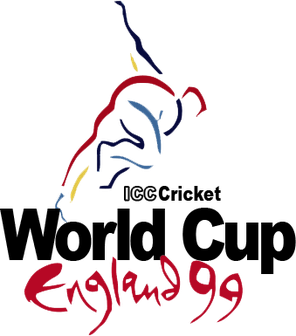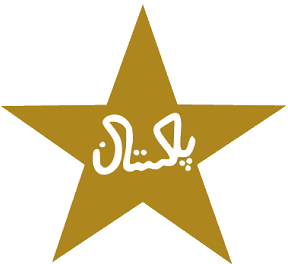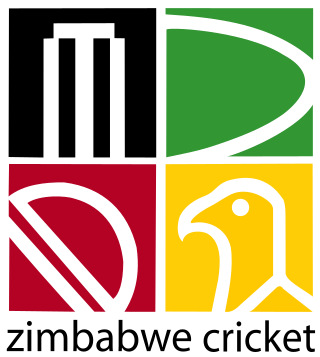
The Cricket World Cup is the international championship of One Day International (ODI) cricket. The event is organised by the sport's governing body, the International Cricket Council (ICC), every four years, with preliminary qualification rounds leading up to a finals tournament. The tournament is one of the world's most viewed sporting events and considered as the "flagship event of the international cricket calendar" by the ICC. It is widely considered the pinnacle championship of the sport of cricket.

The 1999 ICC Cricket World Cup, also branded as England '99, was the seventh edition of the Cricket World Cup, organised by the International Cricket Council (ICC). It was hosted primarily by England, with selected matches also played in Scotland, Ireland, Wales and the Netherlands. The tournament was won by Australia, who beat Pakistan by 8 wickets in the final at Lord's in London.

The Pakistan national cricket team, has represented Pakistan in international cricket since 1952. It is controlled by the Pakistan Cricket Board (PCB), the governing body for cricket in Pakistan, which is a Full Member of the International Cricket Council (ICC). Pakistan compete in cricket tours and tournaments sanctioned by the PCB and other regional or international cricket bodies in Test, One Day International (ODI), and Twenty20 International (T20) formats. Pakistan are current ICC Champions Trophy holders.

The Zimbabwe men's national cricket team, also known as the Chevrons, represents Zimbabwe in men's international cricket and is overseen by Zimbabwe Cricket. Zimbabwe has been a Full Member of the International Cricket Council (ICC) since 1992. As of May, 2023, Zimbabwe was ranked 10th in Tests, 11th in One Day Internationals (ODIs) and 11th in Twenty20 internationals (T20Is) by the ICC.

The Bangladesh men's national cricket team, popularly known as The Tigers, is administered by the Bangladesh Cricket Board (BCB). It is a Full Member of the International Cricket Council (ICC) with Test, One-Day International (ODI) and Twenty20 International (T20I) status. It played its first Test match in November 2000 against India with a 9 wicket win in Dhaka, becoming the tenth Test-playing nation. It became an associate member of the ICC in 1977, and competed in six ICC Trophies but performed inconsistently until 1997, which marked the year of their first major victory, winning the 1997 ICC Trophy held in Malaysia. This set Bangladesh on its way of becoming a Test-playing nation, a journey which ended with success in the year 2000.

The ICC Champions Trophy is a One-Day International (ODI) cricket tournament organised by the International Cricket Council or ICC. Inaugurated in 1998, The ICC conceived the idea of the Champions Trophy – a short cricket tournament to raise funds for the development of the game in non-test playing countries. It remains as one of those ICC events that had the same format as that of another big cricketing event, like the Cricket World Cup, with the format being One Day Internationals.

The Kenya men's national cricket team represents the Republic of Kenya in international cricket. Kenya is an associate member of the International Cricket Council (ICC) which has Twenty20 International (T20I) status after the ICC granted T20I status to all its members.
International cricket played in the 2006 cricket season is defined as matches scheduled between May and August 2006 in all cricketing countries, as well as all international matches scheduled for the 2006 English cricket season. Matches between January and April are defined as belonging to the 2005–06 season, while matches between September and December are defined as the 2006–07 season. The main matches in this period were played in England, as this was in the middle of the English cricket season, but the third edition of the ICC Intercontinental Cup is defined as a part of the 2006 season, even though the tournament stretched into February 2007, and three A teams were also scheduled to tour the northwestern part of Australia in June and July 2006.

Australia at the 1998 Commonwealth Games was abbreviated AUS. This was their sixteenth of 16 Commonwealth Games having participated in all Games meets up to these Games. The games took place in Kuala Lumpur, between the 11th - 21 September. Australia placed first, winning a total of 198, with 311 competitors.
International cricket in the 2006–07 cricket season is defined by major statisticians, such as CricketArchive and Wisden, as those matches played on tours that started between September 2006 and April 2007. Two major ICC tournaments are scheduled for this season, with the Champions Trophy played in October in India, and the World Cup taking place in West Indies in March. In addition, England will defend the Ashes when they go to Australia in November, and all the ten Test nations will be in action during November and December – though Zimbabwe, who are playing Bangladesh during this time, withdrew from Test matches throughout 2006 and will thus only be playing One-day International matches.
The following is a list of important cricket related events which occurred in the year 2007.
The ICC Under-19 Cricket World Cup is an international cricket tournament organised by the International Cricket Council (ICC) contested by national under-19 teams. First contested in 1988, as the Youth Cricket World Cup, it was not staged again until 1998. Since then, the World Cup has been held as a biennial event, organised by the ICC. The first edition of the tournament had only eight participants, but every subsequent edition has included sixteen teams. Among the full members, India have won the World Cup on a record five occasions, while Australia have won three times, Pakistan twice, and Bangladesh, England, South Africa and the West Indies once each. New Zealand and Sri Lanka have reached tournament finals without winning.
A pair in cricket refers to when a batsman is dismissed for a duck in both innings. It is called a 'king pair' if the batsman gets out for a golden duck in both innings.
The 2008–09 international cricket season was between September 2008 and March 2009. The season saw the security concerns for cricket in Pakistan reach a pinnacle. The ICC Champions Trophy, scheduled to be held in Pakistan in September 2008, was postponed to 2009 after five of the participating nations refused to send their teams for the event. In November 2008, a Pakistani militant group launched terror attacks in Mumbai. This led to India cancelling their tour of Pakistan originally scheduled for January and February 2009. Sri Lanka agreed to tour Pakistan in place of India. However, the tour was jeopardised by a terror attack in Lahore where gunmen fired at a bus carrying the Sri Lankan team, injuring six team members. The Champions Trophy was later relocated to South Africa. No international cricket were played in Pakistan for more than five years. This period of isolation ended when Zimbabwe toured Pakistan in May 2015. After successfully hosting a few T20Is against World-XI, the Sri Lanka cricket team and the West Indians from 2017 to 2018, a few matches of the Pakistan Super League from 2017 to 2019, the whole season in 2020 as well as hosting complete tours against Sri Lankan and Bangladeshi cricket teams respectively during the 2019–20 season, built a good reputation of Pakistan. Hence, by the end of 2019, the Pakistan Cricket Board, announced that they would no longer play any of their future home matches at a neutral venue, indicating that International Cricket has returned to the country on full-time basis.

Lokuge Dinesh Chandimal is a professional Sri Lankan cricketer and a former captain of the Sri Lanka national cricket team. A handy right-handed middle order batter who sometimes plays as the wicket-keeper, Chandimal lead Sri Lanka in the group stages of the 2014 ICC World Twenty20 in which Sri Lanka ended up as the champions.
Nida Rashid Dar is a Pakistani cricketer who plays as a right-handed batter and right-arm off break bowler. She is the current captain of the Pakistan women's national cricket team since April 2023.
Madagamagamage Dasun Shanaka is a professional Sri Lankan cricketer and former limited overs captain of the Sri Lankan cricket team. An all-rounder, Shanaka is a right-handed batter and a right-arm medium fast bowler.

The 2018 ICC Under-19 Cricket World Cup was an international limited-overs cricket tournament held in New Zealand from 13 January to 3 February 2018. It was the twelfth edition of the Under-19 Cricket World Cup, and the third to be held in New Zealand after the 2002 and the 2010 events. New Zealand became the first country to host the event thrice. The opening ceremony took place on 7 January 2018. The West Indies were the defending champions. However, they failed to defend their title, after losing their first two group fixtures.
Asitha Madusanka Fernando is a professional Sri Lankan cricketer. He made his international debut for the Sri Lanka cricket team in July 2017.

The 2022 ICC Under-19 Cricket World Cup was an international limited-overs cricket tournament that was held in the West Indies in January and February 2022 with sixteen teams taking part. It was the fourteenth edition of the Under-19 Cricket World Cup, and the first that was held in the West Indies. Bangladesh were the defending champions.











